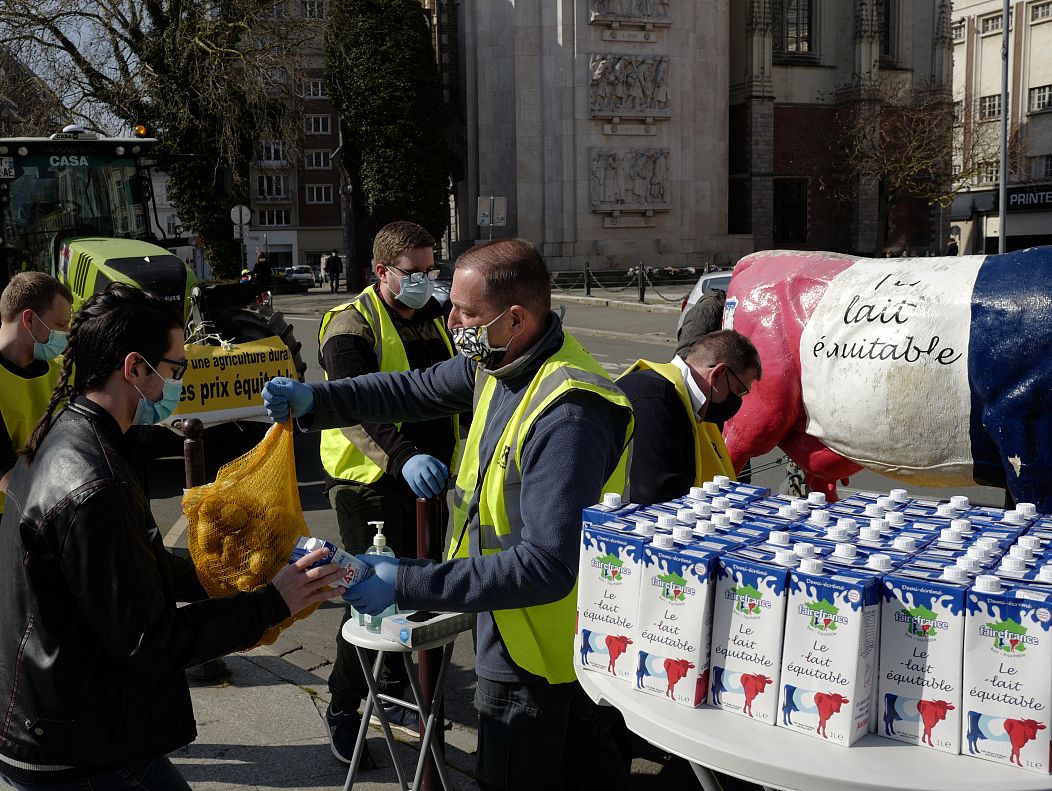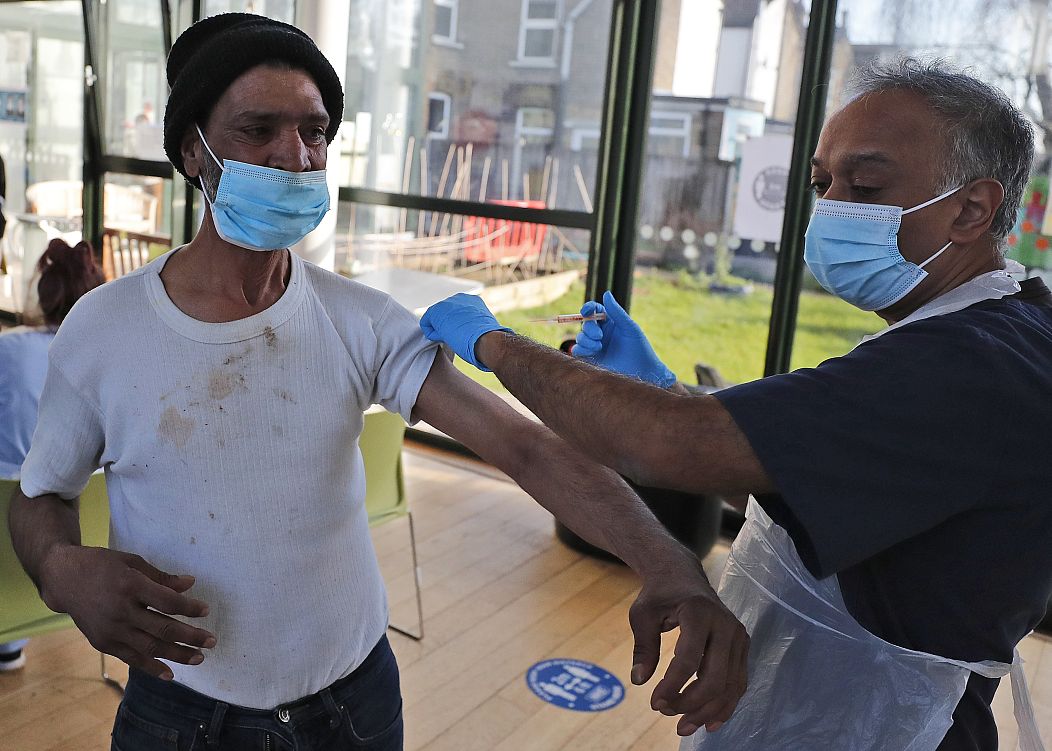"Many people have found themselves with a real drop in revenue during the pandemic, often the most vulnerable, and even a small reduction to money coming in can make a difference. People put healthcare on the back burner," said a Belgian charity worker.
The pandemic has given a serious stress test to Europe's health care systems — some buckled, others quickly adapted.
Not everyone felt the knock-on effects of COVID-19 with regard to accessing health institutions, services and resources to the same degree, with the poor and vulnerable affected far more than the rest of the continent's citizens.
Routine appointments and checkups were cancelled or pushed back in droves and health care fell to the bottom of many people's list of priorities.
Those already grappling with financial hardship saw their situations maintained and in some cases exacerbated, while others were plunged into poverty as their businesses were closed from one day to the next due to lockdowns or being furloughed.
The true cost of the pandemic
Lower income people across the world have, in many instances, suffered disproportionately from the pandemic in general for a number of reasons including the fact that their jobs are more likely to expose them to the virus, and their savings are generally lower.
In the first three months of the pandemic in Europe (March 1 to June 30, 2020), around 170,000 people who were not previously beneficiaries of the Spanish Red Cross requested help from the organisation.
This trend could be seen across Europe, according to Graciela Malgesini, EU and Advocacy Officer at the European Anti Poverty Network (EAPN).
There was "a big wave of people asking for help for the first time" when the pandemic broke out, she said, but this was only "the tip of the iceberg because, of course, many people were unable to act at first.
"They were just wondering what they could do and they said the problem was that everything was closed, the information was not there," she added.
The profiles that were most likely to experience poverty were the self-employed, the elderly, disabled people, students, women in various positions of precarity or with dependents, as well as migrants and Roma, according to Malgesini.
While financial aid was made available in many nations, schemes required beneficiaries to understand how the social security system of a country works and be able to read, write and in some cases speak the language, which often excluded some of the most vulnerable.
What's more, benefits were in many cases based on revenue from previous years, seeing people who had fallen into poverty because of the pandemic left behind.
Front line workers that aren't health workers, such as cleaners, were severely impacted if they caught COVID in some countries, like Italy and Spain, as they couldn't claim the disease as a work-related accident on their health insurance, the expert said.
"People really found themselves in difficult situations," both those who were already struggling financially and people experiencing poverty for the first time, Noellie Denomerenge, who is a caseworker for the Walloon Anti-Poverty Network in Belgium (Réseau Wallon de Lutte contre la Pauvreté).
"Many people found themselves with a real drop in revenue, often the most vulnerable, and even a small reduction to money coming in can make a difference. People put healthcare on the backburner."
"We quickly realised the reality of the situation on the ground when lockdown was first introduced," she said. "People weren't working but medical fees were still there, still had to be paid, and hospitals were pretty much closed to anyone who didn't have COVID."
Among the cases that struck Denomerenge the most was a woman who had a disease, which was diagnosed before the pandemic, that was attacking her flesh.
Her condition required being treated by specialist medical staff "very regularly" but she was not considered a priority to receive emergency healthcare when COVID broke out, the caseworker explained.
"She no longer had fingers, just stumps, her gums were receding ... she had no idea at all how to go and get treated."
"She was in a lot of pain, she couldn't leave her house because she was in so much pain. Because her treatment couldn't be followed up properly her situation is now a lot more complicated."
Denomerenge said this was also the case for people who had leg injuries and many of the elderly who could not function without assistance or regular medical appointments and saw them taken away during lockdown because their conditions weren't considered urgent enough.
Students were also heavily impacted and she said her colleagues in France reported the same issue. Students in further education who had left their family homes weren't going out to get medicine to treat any illnesses, which created a "snowball effect" leaving them unable to study in some cases.
"We have a state system here in Belgium, funded by mandatory health insurance, which works quite well for some people, but only if you are registered in the system," the caseworker said.
"Undocumented migrants, people who are homeless, will not always go to hospital even for emergency treatment, or they can't — this option wasn't available to them for months last year. And sometimes life means that they can't go back the next day for a checkup or to collect medication."
Poverty is a health issue too
Poverty was an issue in the EU even before the COVID crisis, with one in five people at risk of poverty and social exclusion but the pandemic has only increased social inequalities, according to a report Malgesini penned for the EAPN.
Food insecurity and an increasing digital divide are just two of the issues that tethered poverty to health care before the pandemic began and have been compounded since COVID broke out in Europe.
"On one hand, we see the president of the European Commission rightly speaking about the need to digitalise Europe, but, on the other hand, we see the reality of the people who are absolutely challenged by the digital divide: not just the poor and elderly, but also young people who can't use the technology or don't have access to it," said Malgesini.
She added that the pandemic had required companies and individuals to become more tech-savvy, but in digitalising health services like GP appointments, those who couldn't access technology or didn't know how to use, like the elderly, or homeless, were further isolated or left behind.
Food insecurity is not just a social problem, but also a health problem, according to Malgesini.
"If you are poor and you are not consuming the right amount and quality of food, your body becomes weaker and you are more prone to illness," she said.
During COVID times, this was particularly an issue for those who were already isolated, self-isolating because of infection, disabled, and experiencing poverty.
"This was a huge problem almost everywhere on the continent," according to the European Anti Poverty Network expert.
Italy saw a surge of 50% in people using food banks during the first six months of 2020, compared to the same period in 2019.
Encarna Moreno from Mula in Murcia, southeastern Spain, has a 17-year-old daughter, Noelia, with spina bifida — a birth defect that occurs when the spine and spinal cord don't form properly.
Since the COVID lockdown began in March of last year, Noelia has had to stop doing sports, has not had medical appointments for check-ups and does her rehabilitation exercises via video call, which is not comparable to doing them in person, her mother told Euronews.
“The impact of the coronavirus on the economy and job losses is very serious, but it is also serious for people with physical problems, and this has not been talked about,” Encarna said.
“She has been unable to receive the treatment she needs for a full year now.”
Encarna doesn't know for sure if this has affected her daughter's health given she hasn't had a checkup for over a year and a half, but she suspects it has had a severe impact as she said her back pain is worse.
Noelia used to have a checkup every six months at the paraplegic hospital in Toledo, Spain's most specialised hospital for the complete treatment of spinal cord injuries.
There she was given a full examination that included a bladder and kidney check-up, which are important for people with her condition, Encarna explained.
Due to the coronavirus pandemic, her last visit to the facility was in January 2020, with her check-ups being repeatedly pushed back.
Swimming used to really help Noelia with her condition, but pools were closed until recently.
"Sports on dry land are too strenuous, she can't do weights, for example, so swimming is the best fit. The only sport that suits her," Encarna said of her daughter.
"They opened bars, entertainment venues but the pools remained closed. It seems like a pretty safe environment to me — you go in one at a time and there is chlorine everywhere."
Encarna hopes that the situation concerning her daughter's health care will return to normal, with the local pool open and a medical appointment booked in this summer, but she says the difficult times they faced during the pandemic and how little it has been spoken about will never leave her.
Positive effects of COVID
While we can never bring back the millions who have lost their lives during the pandemic, it has sparked some positive changes for the vulnerable trying to access health care, said Malgesini.
This includes drawing attention to gaps in services. "A certain awareness has happened, as well as some positive reflection on the shortcomings and the impact of the pandemic on disadvantaged groups has been made by governments with the help of the EU," she explained.
Health systems were analysed in connection with the bloc during the second part of 2020, which found issues with budgets in terms of insufficient investment in health care, additional strain on health systems, workforce pay, and shortages of health workers or skills deficits.
"Many countries showed limited coordination and integration of care and that social and health care are disconnected. This is something that needs to be bridged," Malgesini said.
Despite this, the COVID crisis has as a general rule across Europe caused an increase in social vulnerability, a drop in well-being, a rise in the feeling of loneliness, and mental health challenges, she added.
"The idea that no one is safe until everyone is safe is a very powerful one we should all remember," the expert added.
"Poverty is not only unjust, it's also unethical and it is making societies weak towards epidemic shocks and crisis," which the COVID pandemic has shown.
March 29 - April 2 is #HealthcareWeek at Euronews. It's a week of special coverage focused on the lessons learned from the COVID-19 pandemic and the trends poised to shape Europe's healthcare in the coming years.













